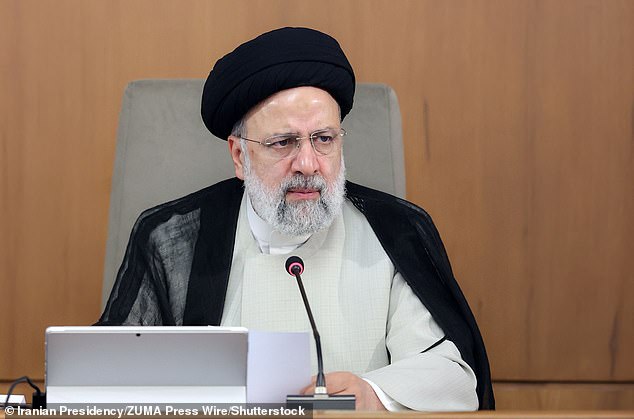Tyrants and terrorists have been mourning the death of Iran’s president, Ebrahim Raisi, after his surprise death in a helicopter crash on Sunday.
The terrorist group Hamas, the Lebanese militia Hezbollah, armed groups based in Iraq and the Syrian government – all members of the so-called “Axis of Resistance” against Israel and its Western allies – expressed their condolences on Monday.
Russian President Vladimir Putin, in a statement released by the Kremlin, described Raisi as “a true friend of Russia.”
Iran has been supplying Russia with ammunition and drones to support its ongoing invasion of Ukraine that has wreaked havoc across the country.
Hamas mourned Raisi as an “honorable supporter” of the Gaza-based group whose Oct. 7 attack on Israel killed some 1,200 people in Israel and prompted retaliation by the Jewish state in the bloodiest war ever seen in the coastal territory.
Tyrants and terrorists have been mourning the death of Iran’s President Ebrahim Raisi (pictured) after his surprise death in a helicopter crash on Sunday.
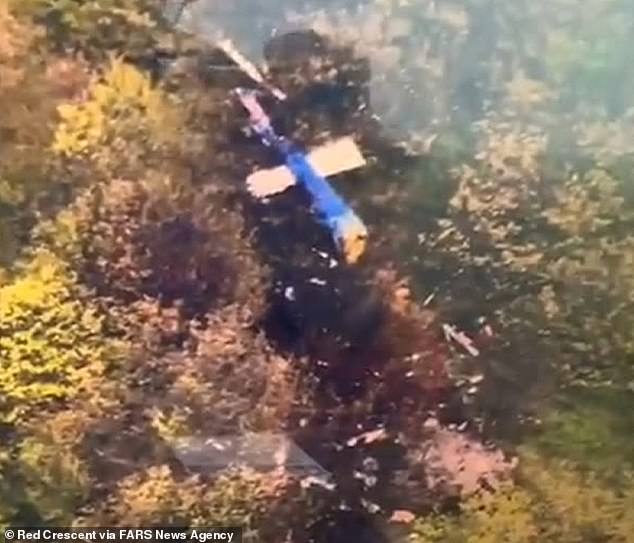
Raisi was confirmed dead after rescuers found a helicopter carrying him and other officials had crashed in the mountainous area of northwest Iran the previous day. Drone images were seen from the crash site early Monday morning.
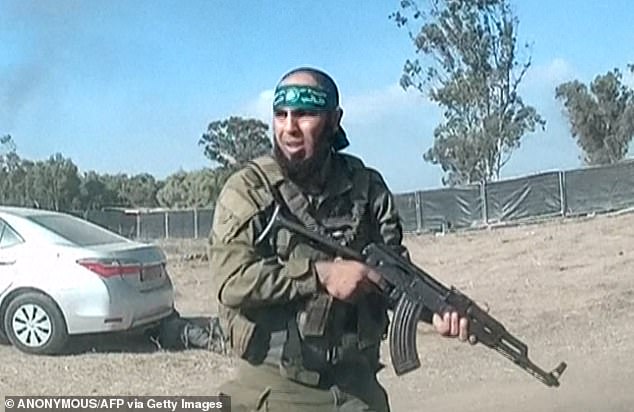
Hamas mourned Raisi as an “honorable supporter” of the Gaza-based group whose Oct. 7 attack on Israel killed some 1,200 people in Israel and prompted retaliation from the Jewish state in the bloodiest war ever seen in the coastal territory.
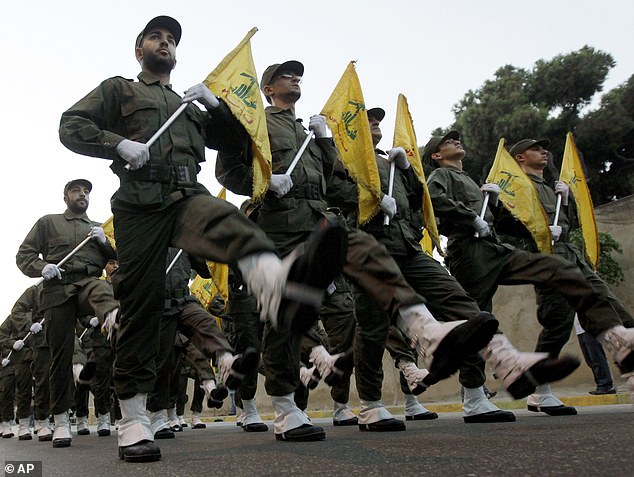
The powerful Lebanese group Hezbollah, which has exchanged deadly cross-border fire with Israel amid the war, praised Raisi as “a strong supporter and strong defender of our causes… and a protector of resistance movements.”
Hamas said it appreciated Raisi’s “support for the Palestinian resistance and his tireless efforts in solidarity” with the Palestinians since the start of the war between Israel and Hamas in Gaza.
Iran has hailed the October 7 attack that sparked the war as a “success” but denied any involvement. In a series of tit-for-tat attacks, Tehran also launched drone strikes against Israel which had previously attacked sites in the Islamic Republic.
Also among the eight people who died when the helicopter crashed on a remote mountainside in dense fog was Iranian Foreign Minister Hossein Amir-Abdollahian, known for his fierce anti-Israel sentiment and skepticism toward the West.
Hamas also praised Raisi and Amir-Abdollahian’s “intense political and diplomatic efforts to stop the Zionist (Israeli) aggression against our Palestinian people.”
Meanwhile, the powerful Lebanese group Hezbollah, which has exchanged deadly cross-border fire with Israel amid the war, praised Raisi as “a strong supporter and strong defender of our causes… and a protector of resistance movements.” .
“Hezbollah in Lebanon expresses its deepest condolences,” the group said in a statement, adding that it had known Raisi “closely for a long time.”
Lebanon announced three official days of mourning.
Syrian President Bashar al-Assad expressed solidarity with his close ally Tehran, which has backed him during more than a decade of civil war.
Assad “affirmed Syria’s solidarity with the Islamic Republic of Iran and with the families of the deceased and his comrades,” the Syrian presidency said in a statement.
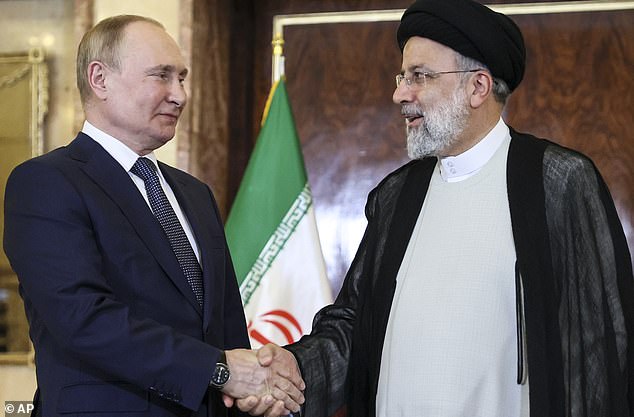
Russian President Vladimir Putin (pictured shaking hands with Raisi in 2022), in a statement issued by the Kremlin, described the late president “as a true friend of Russia.”
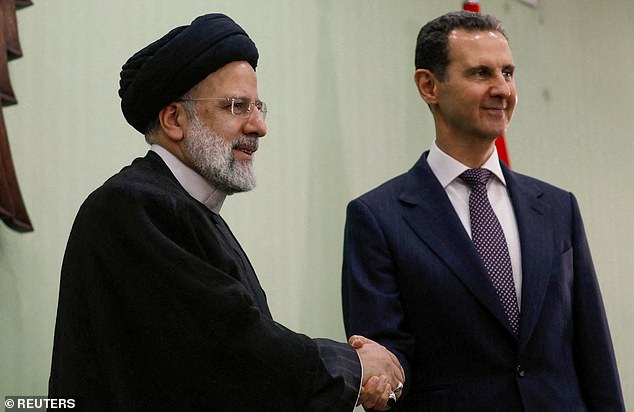
Syrian President Bashar al-Assad (pictured with Raisi in 2023) expressed solidarity with his close ally Tehran, which has backed him during more than a decade of civil war.
“We worked with the late president to ensure that strategic relations between Syria and Iran always flourish,” the statement added.
The Popular Mobilization Forces of Iraq, or Hashed al-Shaabi, also expressed their condolences, adding that Raisi “had always stated that Iraq and Iran are one people that cannot be separated.”
The Hashed are an integral part of the official Iraqi security apparatus under the authority of the prime minister, which also includes several pro-Iran armed factions.
Iraqi Prime Minister Mohamed Shia al-Sudani said “we stand in solidarity with the Iranian people.”
The collapse comes as the Middle East remains unstable due to the war between Israel and Hamas, with tensions with the West at dangerous levels.
Under Raisi, Iran enriched uranium to weapons-grade levels more than ever before, as Tehran also supplied bomb-carrying drones to Russia for its war in Ukraine and to armed militia groups across the region.
Iran has also faced years of mass protests against its Shiite theocracy over its weakened economy and women’s rights, making the moment that much more sensitive for Tehran and the country’s future.
IRNA said eight people in total were killed in the crash, including three crew members of the Bell helicopter, which Iran bought in the early 2000s.
Planes in Iran face a shortage of spare parts and often fly without safety checks due to Western sanctions.
That’s why former Iranian Foreign Minister Mohammad Javad Zarif tried to blame the United States for the accident in an interview on Monday.
Mr Zarif said: ‘One of the main culprits of yesterday’s tragedy is the United States, which… Embargoed the sale of aircraft and aviation parts to Iran and is not allowing the people of Iran to enjoy good aviation facilities.
“These will be recorded on the list of United States crimes against the Iranian people,” he said.
The United States has yet to comment publicly on Raisi’s death.
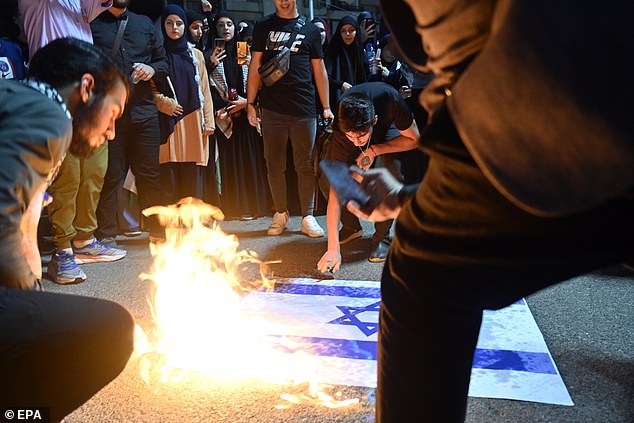
The terrorist group Hamas, the Lebanese militia Hezbollah, armed groups based in Iraq and the Syrian government – all members of the so-called “Axis of Resistance” against Israel and its Western allies – expressed their condolences on Monday. Pictured: Hezbollah supporters burn an Israeli flag during the celebration of the October 7 attacks.
Condolences also poured in from neighbors and allies, after Iran confirmed that there were no survivors of the accident.
Pakistan announced a day of mourning and Indian Prime Minister Narendra Modi said in a post on X that his country “stands with Iran in this time of grief.”
The leaders of Egypt and Jordan also offered their condolences.
Azerbaijan’s President Ilham Aliyev said he and his government were “deeply shocked.” Raisi was returning on Sunday after traveling to Iran’s border with Azerbaijan to inaugurate a dam with Aliyev when the accident occurred.
Turkish President Recep Tayyip Erdogan expressed his condolences.
Supreme Leader Ali Khamenei, who had urged the public to pray on Sunday night, emphasized that the affairs of Iran’s government would continue no matter what.
Under the constitution, Iran’s vice president takes power if the president dies, with Khamenei’s consent, and new presidential elections would be called within 50 days.
Khamenei’s condolence message on Monday declared five days of public mourning and acknowledged that Mokhber had assumed the role of interim president.
Mokhber had already started receiving calls from foreign officials and governments in Raisi’s absence, state media reported.
An emergency meeting of Iran’s cabinet was held when state media made the announcement on Monday morning.
The cabinet later issued a statement promising that it would follow Raisi’s path and that “with the help of God and the people, there will be no problems with the management of the country.”
Raisi, a hardliner who previously led the country’s judiciary, was seen as a protégé of Khamenei, and some analysts had suggested he could replace the 85-year-old leader after Khamenei’s death or resignation.
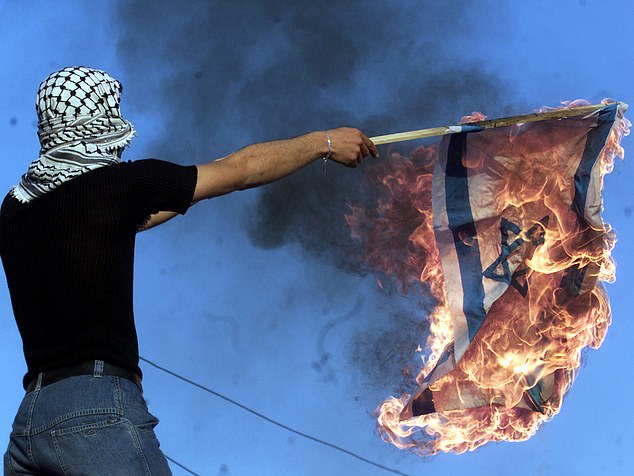
A man wearing a keffiyeh burns an Israeli flag
Following Raisi’s death, the only other person suggested so far has been Mojtaba Khameini, the Supreme Leader’s 55-year-old son.
However, some have expressed concern that a member of the family took office for only the third time since 1979, particularly after the Islamic Revolution overthrew the shah’s Pahlavi hereditary monarchy.
Raisi won Iran’s 2021 presidential election, a vote that saw the lowest turnout in the Islamic Republic’s history.
He was sanctioned by the United States in part for his role in the mass execution of thousands of political prisoners in 1988, at the end of the bloody Iran-Iraq war.

